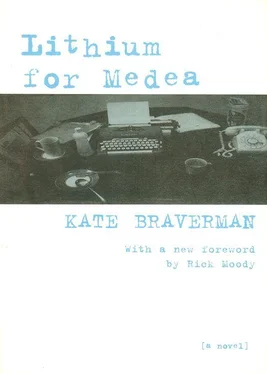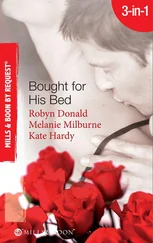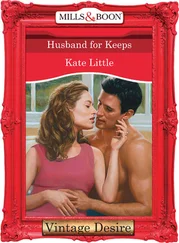“Let’s look at the babies,” Francine suggested.
We rode the elevator to the fourth floor. We stood in front of the viewing window where the daily crop of newborn infants were displayed, wrapped in white and perfect, their tiny fingers curled like the petals of certain utterly white orchids.
“Your father and I wanted this for you,” Francine said. She looked sad. “Was it such a terrible dream to have? That you’d marry someone? Form bonds with meaning? Let a child grow from your love?” Francine studied me. “I loved being a mother, remember?”
And it was Philadelphia in winter. Snow fell soft, crystalline, a fine layer of white gauze sealing us together. Logs burned in the fireplace. Francine was reading poetry out loud. She was baking an apple pie. I was given my own slab of dough, my own small pie tin. We made a big pie and a little one. Sometimes Daddy ate mine. Mother was ironing. I ironed handkerchiefs and napkins while she ironed Daddy’s shirts. We were waiting for Daddy to come home, to make the house warm, make Mommy laugh, make us safe for the night. And Daddy was pulling off his dark wool winter coat. He was standing at the kitchen sink scrubbing his hands, the room smelling of turpentine and soap, a dash of hand lotion, a sense of meat in the smoke.
“Your father would have liked a grandchild. He would have been good with a kid. He loved children, remember?”
When I remember my childhood it is always winter. My father is shoveling snow. My father is a big dark bundle in the center of the blizzard-sheeted street. We are dragging my sled through the snow. The sky is a net of whittled branches. My father is pulling me to the top of hills. In a vacant lot we find a stream. I dream rafts, barges, harbors. And I’m sliding through snow and laughing.
Beyond the viewing window the babies were slowly swaying in their identical white cribs, responding to an inner tide. First one, and then another, like a row of white dominoes. Francine was tapping her hand on the glass.
“You probably can’t even have one now, after all the drugs,” she said. She let herself shudder.
The hospital doors snapped open for me, a kind of glass mouth. An older man sat hunched and weeping on the grass near the emergency ambulance driveway. No one looked at him. He was still there as I drove out of the parking lot, a small mound lost beneath the shadows the building cast.
I walked the three steps up to my porch. My cousin Rachel had written. I sat on the porch and read her letter twice. Then I telephoned Jason.
“I miss you.” I paused. Did I miss him? “I missed you last night.”
“I’m here now. Do you want me now?”
Now, now. I said yes.
Despite everything, when Jason offers me a piece of a day or a night, I feel six years old again. I am driving with Daddy in the old gray Hudson. He’s going to buy me an ice cream cone. Daddy is taking me to the circus, the aquarium, the zoo. When Jason offers me anything I feel whole. I feel loved.
I studied my house. The last vestiges of Gerald Campbell had been thrown away. Jason’s canvases were stacked neatly near the front door. The house was thinning. I could strip it down further.
There were the gifts from Francine that I no longer needed, had never needed. All the hard hooks and little anchors she gave me. They were attempts to weigh me down to the thing she called the real world. When Francine talked about the real world she made it sound as if she held the patent.
I assembled hand-painted vases Francine had bought on business trips to Rome and Jerusalem, Buenos Aires, Paris. If I could just cut back the unnecessary shape and mass, the sense of past inhabitation, perhaps I would be able to understand. Perhaps with the walls and floors free from the weight of furniture and tourist artifacts, the truth would snap loose, dusted off, perfectly clear.
“You can’t do this to me,” Jason said. He was stunned. It was a year ago or two years ago, after our reconciliation.
“Do what?” I asked softly.
I knew precisely what. I had been gone that night. I had been gone the better part of a week with another man.
The other man meant nothing. He was irrelevant, a kind of driftwood. He didn’t stop the pain that was Jason. Beneath the surface weren’t men the same, encased in their separate sets of idiosyncrasies? I no longer had the ability to memorize a new set of boundaries. Jason had burned me out.
“Where have you been?” Jason demanded.
“You don’t want to know,” I said softly, evenly, enjoying the tension in his voice.
Jason hung up. He opened the front door of my house without knocking. He grabbed me by my shoulders and pushed me against the wall.
“Bitch,” he hissed. “I want to know.”
“I was with someone.”
“I know that, bitch. I can smell it.”
Once I had smelled it on him, too. It was like an invisible stain, the small tendrils of someone else, a faint impression left on the skin, a kind of resin.
“Does he fuck you like this?” Jason demanded. He was tearing off my jeans. He was pushing me farther against the wall. “Does he, bitch? Fuck you like this? Fuck you like I do?”
“Nobody fucks me like you do,” I whispered, my forehead pressed against the cool plaster walls.
“Why spoil it?” Jason asked. He was finished.
I was sitting on the floor. I lit a cigarette and looked at him. “I don’t trust you, obviously.”
Jason’s face was tight with a slow white spreading anger. There would be retribution. It didn’t matter. His new weapons could only be variations and refinements on the old. And I had already been singed past bone. I was almost pure, beyond ash.
Later there would be escalations. Later I would come to Jason’s studio when night was already thinning and going gray.
“Get laid?” he asked, opening his front door for me. I brushed his naked body as I walked in.
“Yes,” I said into the darkness. I felt Jason walking behind me, a special dark heat at my back.
I lay down on his bed. I was a prop being taken down from a shelf. I would be dusted and polished, briefly admired. Then Jason would put me away again.
“Did he make you feel this much alive?” Jason asked. He was breathing in uneven short angry puffs like smoke.
“Actually, it was soft and gentle.”
“Gentle? Since when is that your bag?” Jason sounded mildly surprised.
I didn’t say anything. I had gone to a party. I found myself talking to a young woman. She was nineteen. She played a harpsichord in a small orchestra. The woman needed a ride home. I had driven her.
I watched the woman move through her rooms. She was graceful and deft, strangely confident. I had never been nineteen in that way. I had doubts. I leaned over toilets and vomited. I stood in the steamy shadows of Giovanni’s Italian Restaurant with the pasta in big fat black pots and dragged myself half asleep, half dead, through the rooms, the streets.
All at once the girl turned her face toward me. She looked younger than nineteen. She played a harpsichord. She didn’t want to marry, ever. She looked younger than I had ever been. She leaned over and kissed me. Her mouth startled.
I surprised myself. Something sparked electric, risky, raw. I stayed with her. I took off my clothing. I felt determined. She left a light on in the hallway. I sat down on the edge of her bed. I watched her light a candle and hoped it would be simple, painless, something I could wash down the drain, change clothing, stand in supermarket lines and no one would know. And I offered my face to the other. My lips were kissed, my chest pressed. I was a good grape, breaking and scattering juice.
“Come from your gentle lover?” Jason asked.
Читать дальше












